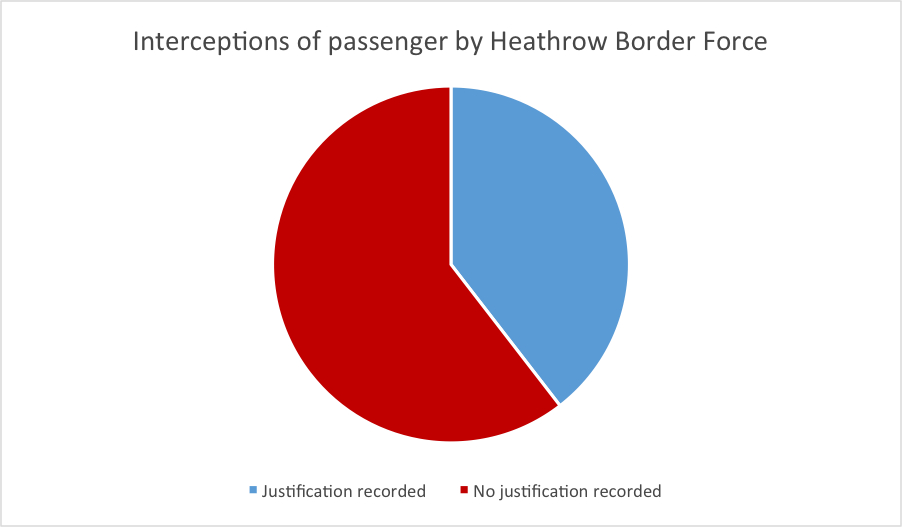- BY Paul Erdunast

Inspection finds Border Force Officers at Heathrow Airport fail to keep adequate documentation
THANKS FOR READING
Older content is locked

A great deal of time and effort goes into producing the information on Free Movement, become a member of Free Movement to get unlimited access to all articles, and much, much more
TAKE FREE MOVEMENT FURTHER
By becoming a member of Free Movement, you not only support the hard-work that goes into maintaining the website, but get access to premium features;
- Single login for personal use
- FREE downloads of Free Movement ebooks
- Access to all Free Movement blog content
- Access to all our online training materials
- Access to our busy forums
- Downloadable CPD certificates
Last month’s report by the Independent Chief Inspector of Borders and Immigration, Inspection of Border Force Operations at Heathrow Airport, reveals that the Border Force Officers at Heathrow Airport are failing to record justifications for detention and searches of passengers. If they did keep a record, they often failed to complete notebook records shortly after the event took place, in breach of their own guidance. This is extremely serious because without documentation of events, there can be no proof of abuses if and when they happen. With that comes total impunity for officers of the state and the flouting of the rule of law.
This blog reported last week that the inspection of family visit visas by the Independent Chief Inspector of Borders and Immigration highlighted major issues with the quality of decision-making on family visit visas, and was unpersuasive in its assertion that the removal of the full right of appeal has not led to a higher refusal rate. At the same time, the Chief Inspector released a report into the effectiveness of the Border Force at Heathrow Airport.
The inspection did not find any major problems with the decisions themselves, or how the Border Force Officers dealt with passengers. This is positive. However, the report highlights serious failings of Border Force Officers to keep adequate reports of incidents, in breach of their own guidance. This includes both not writing a report soon after an incident, and not writing a report at all. This is troubling enough in itself. Border Force Officers’ guidance makes it clear that if notes are not written up as soon as possible after the event, they may not be relied upon by the officer if the case were to go to court. This is because notes not written up immediately after the event are less likely to be accurate records of what happened. They are more likely to be rose-tinted, or plain false.
Border Force was unable to provide the inspection team with the all of the documentation it requested in relation to search of person activity. Therefore, it was unable to demonstrate that all search of person activity within the customs channels was lawful and proportionate.
This is why it is doubly suspicious that the Border Force Officers were also failing to store their notebooks on official premises. This practice leaves the notebooks prone to tampering, since there is no account of where they are kept out of hours. And where notebooks may be tampered, there can be no accountability of Border Force Officers, and evidence of abuses can easily vanish into thin air.

The scale of the lack of documentation beggars belief. In 63% of cases inspected, there was no documentation justifying the officer’s interception of the passenger.

Even more shockingly, in a full two-thirds of cases there is no documentation to show that the passenger has been informed of their rights by the officer.
When the inspectors observe the Border Force Officers, it is only natural that they be on their best behaviour. During the observations, the inspectors found that the officers “acted professionally at all times”. It is undoubtedly positive that the officers understand best practice. But most of the time the inspectors are absent, and so the only evidence of whether there has been an abuse is in the documentation. The inspection does not find that there have been abuses – but for all we know there may have been a 63% abuse rate, because there is a lack of documentation to justify 63% of passenger interceptions.
BFOs were not always storing their notebooks on official premises. This was in breach of Border Force guidance. Some managers were aware of this practice, but had taken no action. Notebooks often contain personal information relating to passengers, in addition to sensitive operational information, and must be properly protected and readily retrievable.
This is probably a matter of incompetence and forgetfulness rather than scheming. Nonetheless, the courts interpreted Home Office incompetence in record-keeping as malice in Patel [2014] EWHC 501 (Admin), which this blog reported on last year. In that case the High Court awarded the claimant £125,000 in damages. While that judgment was overturned three months ago by the Court of Appeal, the Home Office could have avoided the whole sorry saga simply by taking better notes. So not only does good record-keeping benefit the claimant, but it is also in the best interests of the Home Office, in order to avoid costly litigation.
The consequence of poor documentation in terms of the rule of law cannot be overstated. This is recognised by the Border Force guidance, and by the acceptance of the criticism by the Border Force in their reply. It need not be stated that those who carry out torture and extrajudicial killings regularly use a lack of documentation to proliferate these acts with impunity. This blog does not allege abuses happen in Heathrow on that level, but inadequate record-keeping opens the door to a whole host of pernicious abuses which may be carried out with impunity. It is imperative that the Border Force take the recommendations of the inspection on board. Their positive response is to be welcomed.
